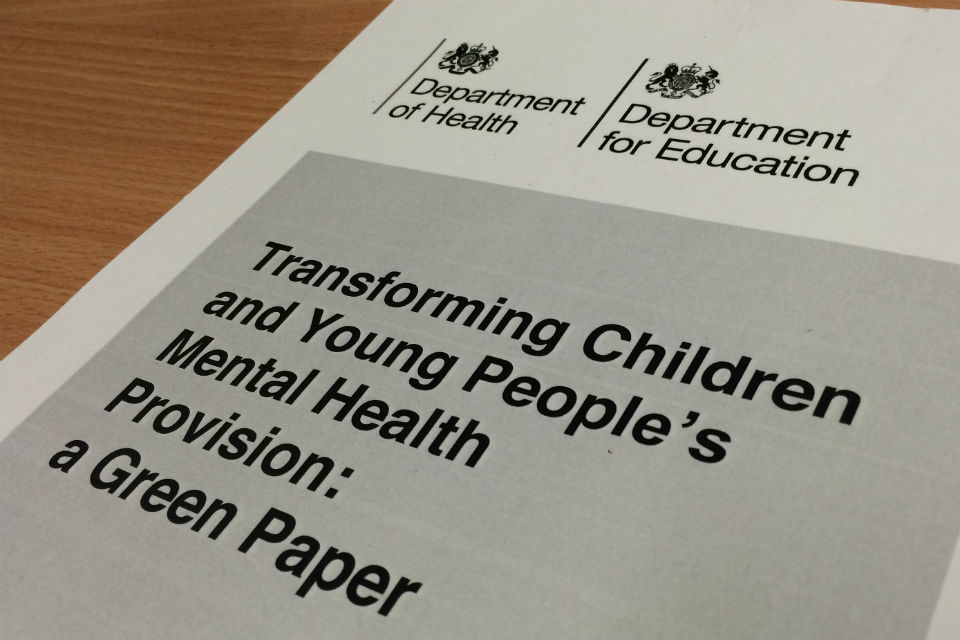
So many of the issues we work on as civil servants can’t be tackled by just one department. Ensuring people with mental health problems are supported and live productive and fulfilling lives is just one such issue.
In 2012, the Government enshrined in law the principle of “parity of esteem”. This meant that people with mental health problems should receive equal treatment from the NHS as those with physical health problems. However, we know that tackling the complex determinants of poor mental health needs can’t be achieved through legislation alone.
Half of all cases of mental ill-health in adults have started before the age of 15, and one in ten young people aged 5 to 16 has a diagnosable mental health condition. To put it another way, that’s three children in every classroom. So when the Prime Minister announced in January 2017 that she wanted to tackle the “burning injustice” of mental health - faced by young people in particular - it was clear that we needed to work with the Department for Education to work out how to extinguish those flames.
We set up a joint project team, not only with the DfE, but bringing together two of our key arm’s length bodies, NHS England and Public Health England. Analysts from both departments were also part of this team from the outset – keeping us focused on the evidence base, and supporting the policy development all the way through. There’s a wealth of other expertise on children’s mental health out there too; and our stakeholder engagement work meant that we were constantly testing our thinking with people who knew what would and wouldn’t work, and refining policy ideas.

Our Secretary of State was keen that the Green Paper was bold and ambitious, and we think the proposals in the Green Paper we published in December 2017 fulfil that requirement. We’re creating a new workforce of ‘mental health support teams’, working in or near schools and colleges to support children showing early signs of emotional distress; incentivising schools and colleges to train a designated lead for mental health; and trialling a new four-week waiting time standard for access to children’s NHS mental health services. We’ve also announced other proposals for supporting young people’s emotional wellbeing, including a range of ways in which schools can play their part, such as teacher training and curriculum changes; looking at support for 16-25 year olds, a period during which they face particular difficulties; and boosting the evidence base in a number of areas.
We worked with the DfE right from the scoping stage of the project. Weekly project team meetings were combined with many more informal contacts and joint discussions. We ran joint stakeholder engagement events, and frequently appeared at other events as a double-act with DfE colleagues. This demonstration of joined-up government in practice was frequently warmly noted by stakeholders. Close working relationships also made it a lot easier to resolve any differences of opinion or approach along the way. An additional happy benefit of the joint working during the policy development process was that we brought together health and education stakeholders. The result was that both heard the others’ points of view, and we perhaps played a small part in forging greater understanding.
We’re now seeking views on the Green Paper proposals through an online consultation. This is supported by jointly run stakeholder roundtables; a ministerial event to engage parliamentarians (co-chaired by DfE and DH ministers); and joint focus groups to ask young people themselves what they think. So far, we’ve received almost 1,000 responses to the online consultation, and expect many more by the time it closes. You can read the Green Paper here, and we welcome all responses to the consultation here (consultation closes at noon on 2 March 2018). Please do promote it to your networks, friends and families.

4 comments
Comment by Charlotte Smith posted on
Mental Health issues is a subject very close to my heart for a variety of reasons that i wont go into here, but suffice to say i have been personally touched by it.
The proposals outlined is a very good one, but you have overlooked a vital element. What about those youngsters who have fallen through society's safety net. I am of course thinking of youth offender system and those who are sent to youth offenders institutions. What i particuarly have in mind are those who are repeat offenders and end up in adult prisons and spend much of their lives in and out of prison.
Surely the needs of the offender at a young age and into their teenager years needs to be accomodated for. We need to look again at WHY they reoffend. And better care needs to be taken of their release back into society. Mental health needs to be at the heart of the rehabilitation process.
Comment by Donna Lumsden posted on
I think this is a great idea, I would like to be an advocate for mental health because of my day to day dealing with the issues with my foster son and my past experiences working with people with mental health
Comment by Donna Lumsden posted on
I think this is a great idea, I would like to be an advocate for mental health because of my day to day dealing with the issues with my foster son and my past experiences working with people with mental health
Comment by Eileen Dobinson posted on
Mental health has been a poor relation for too long. One only has to look at the rise in suicide amongst young people to see this. People in the services are dedicated, but they are hampered by the lack of investment made by successive governments. This is so short sighted. A healthy workforce can pay their taxes are lead worthwhile lives. Money spent would be well worth it